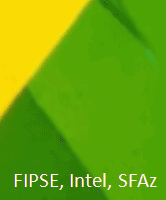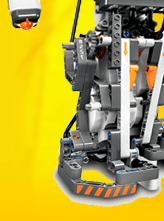Q: How do I know if this program is right for my child?
A: Two robotics camps are offered in each summer. The Camp7up is
desined
for students entering grades 7 through 9. Exceptional can be made to students
entering grade 6, if the student is in a robotics club, is involved in similar
activities, or is recommded by a teacher. The 9Up camp is designed for high school students (grades 9 through 12).
However if a younger student has attended the 7Up camp, the student can be
enrolled in 9Up camp. In
the 7Up camp, students will learn to construct
LEGO NXT Mindstorm robot, write program to control the robot
to compete different missions. The camp will inspire and
prepare the students for joining
FIRST Lego League (FLL) Robotics Challenges.
3D movie and game design will also be taught in 7Up camp. In 9Up camp, participating students will learn more
advanced programming and will be assigned more challenging
missions to complete. It includes Micirosft Robotics Studio, Visual Program
Langauge Language VPL, Web, service-oriented computing, and device programming.
Q: Will my child earn college credit?
A: School of Computing and Informatics pre-college summer camps are not offered for college credit. However, the programming experience is related to college programming classes.
Q: Are Robotics Camps an educational as well as an entertaining experience?
A: The program provides a rich learning environment for students. Fundamental concepts in science, engineering, computing and robotics are explored, with a focus on the practical nature of each subject. Courses concentrate on real world application of the subject. Students learn teamwork and responsibility through participation in group projects presented to industry professionals, friends and family.
Q: What are the unique features of ASU Robotics Camps?
A: Many colleges and schools offer robotics
camps and students learn computer programming through
interaction with robots and robotic games. ASU robotics camps
are similar because the program also teaches computer programming, game programming and robotic software development. However, the program is developed from a pilot program sponsored by U.S. Department of Education, which offers additional benefits as it covers the latest software development technology, such as service-oriented computing, which exposes students to this modern software technology early in their learning career. Service-oriented computing facilitates rapid software development and encourages software reuse. The new software development approach has been adopted by all major computer and software companies including IBM, Microsoft, SAP and Sun Microsystems, and government agencies such as the U.S. Department of Education, U.S. Department of Defense and the State of Arizona. Learning service-oriented computing will give students a head start in their science and engineering career.
Q: How difficult are the service-oriented computing and software-oriented software development?
A: Service-oriented computing and software-oriented software development are easier than traditional programming, because the new software development approach is based on predeveloped software services called components. Instead of using a high-level programming language for software development programming, students in the
robotics camps will learn to develop software using drag-and-drop methods based on predeveloped components.
Q: Is there a family event associated with the camp?
A: The robotics camps will have an open Robotics Competition on the last day of class. The students will complete for fun and prizes. Family and friends encouraged to attend to support their teams.
Q: Can students continue to practice the skills learned in the camp?
A: The software used in the camp is free and can be downloaded and installed on a personal computer, so a student can easily continue to exercise their skills learned in the camp and use materials from the camp. A 3-D animated virtual robot is available for downloading if a student does not own a physical robot. However, a physical robot, the Lego Mindstorm NXT
robot, can be purchased in most electronics stores or directly
from the
Lego Education website.
Q: Do students have to attend for the entire duration of camp?
A: Students are expected to attend the camp for which they register in its entirety. Group projects require involvement from all team members of the camps. If your child needs to miss more than two days of the program due to family, school or other obligations, they should not apply. The subject matter of each camp is condensed into a short period of time, therefore missing even a few days can be detrimental to a student's understanding of the material and their ability to participate.
Q: What level of supervision is provided?
A: An ASU faculty member is responsible for the contents of the program and teaching the principles and concepts in science, engineering, computing and robotics. A graduate teaching assistant will supervise students' laboratory and hands-on work during class (lunch-break excluded). Students are accompanied on off-campus trips during course hours. It is mandatory for parents of students under 18 to sign and submit the Field Trip Permission Form before any child is permitted to leave campus with our faculty. This form will be included in the packet of materials sent after registration.
Q: What happens if there is an illness or emergency?
A: In the event that a student becomes ill during the camp or does not arrive within one hour of the course start time on any given day, we will call the emergency contact number. Parents will be asked to provide this emergency contact number at registration.
Q: Are there any additional costs?
A: The camp fees do not include the cost of lunch. However, a lunch area is available for self-prepared lunches. There are many restaurants in the immediate area and places to eat lunch on the premises.
Q: How do I apply for the financial aid?
Scholarships (assistantship) are available for both of our Robotics camps 7Up and 9Up.
The scholarship can cover full or partial tuition, depending on the need, the available fund, and the number of applicants.
Those who would like to apply for the scholarship must pay the $50 non-refundable processing fee.
We will send you an email with the scholarship questionnaire that will need to be submitted with the necessary paperwork.
Please do not include any tax documents with social security numbers. If your child is part of a lunch program at school,
please provide that documentation from your school. The applications will be evaluated one month before the camp starts.
Seats are guaranteed if the full or partial tuition is awarded, and the $50 registration fee is received.
Q: Whom may I call with additional questions?
A: For content-specific information, please contact Dr. Yinong Chen, Robotics Camps Coordinator at 480.965.2769.
Accomodations: Special Needs
If your child has a disability and has a need for an accommodation in order to participate in this program,
please notify Carrie Clemens at the School of Computing, Informatics and Decision Systems Engineering at
Carrie.Clemens@asu.edu or (480)965-3199 to discuss your child’s needs. Receiving requests for
accommodation at least 4 weeks prior to the start date of the program provides a reasonable amount of time to review,
consider and meet the request if possible. ASU complies with the Americans with Disabilities Act of 1990, and other
applicable Federal, State, and local laws.




